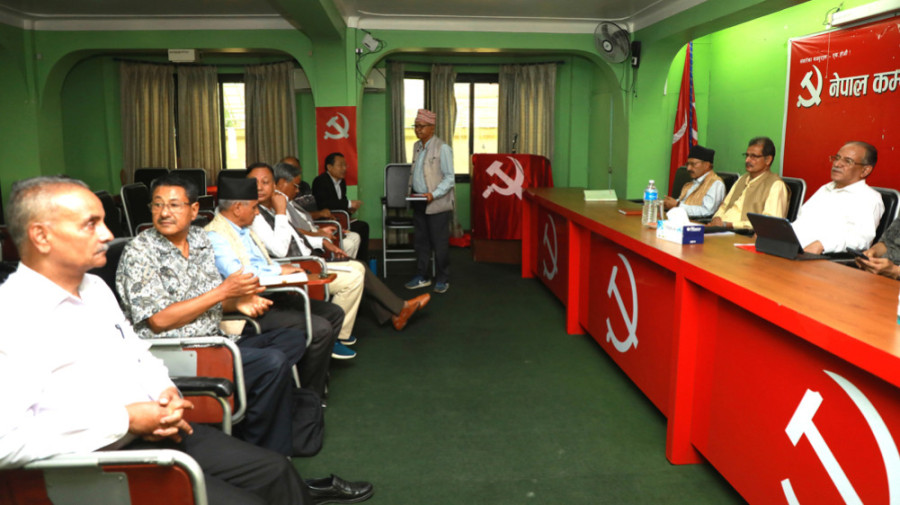Politics
Out of power, Maoist leader Dahal seeks broader unity to build strength
Maoist Centre leaders urge soul-searching, as their party has gradually been weakened.
Post Report
Former prime minister and CPN (Maoist Centre) Chairman Pushpa Kamal Dahal said on Saturday that he will propose broader unity among the leftist parties.
According to party spokesperson Agni Prasad Sapkota, at the ongoing Standing Committee meeting, Dahal proposed a left unity that goes beyond the Socialist Front, an existing alliance of four left and socialist parties in Nepal. The front was announced on June 19 last year. Apart from the Maoist Centre, the CPN (Unified Socialist), the Nepal Socialist Party led by Mahendra Yadav and the Communist Party of Nepal led by Netra Bikram Chand “Biplav” are associated with the front.
“Nepali people want greater unity among leftist parties and reorganisation of communist parties,” Sapkota quoted Dahal as saying. “That a similar plan did not work in the past does not mean it won’t work in the future as well.”
The UML and the Maoist Centre formed an alliance in 2017 to jointly contest the general elections and won an overwhelming majority in Parliament. They merged to form the Nepal Communist Party (NCP) in June 2018. However, the party was dissolved in March 2021 after the Supreme Court invalidated the unified party’s registration.
Dahal also hoped that, in due course, more parties and leaders would join hands for a larger reorganisation of the communist parties.
The ruling UML, the largest communist party at the moment, has decided to stay away from such an alliance.
Dahal stressed that there was no alternative to unity among the leftist parties, according to a leader who attended the meeting.
“We are in talks with Madhav Kumar Nepal of the CPN (Unified Socialist) and Netra Bikram Chand of the Communist Party of Nepal, as well as with some other outfits, in order to form a progressive alliance,” Dahal told the party’s standing committee. “Now, the time has come for unity among the left parties while also bringing together patriotic, pro-people and progressive forces.”
The Maoist Centre, which is a distant-third biggest party in the House of Representatives with 32 seats, is discussing ways to improve the party’s image by launching a purge in the party and building a more solid organisational base.
Several standing committee members urged the top leadership to launch a campaign to strengthen the party organisation, said Sapokta. The Maoist Centre also has decided to push for the directly-elected presidential system to ensure political stability.
The Maoist party’s position is that there is no alternative to an executive president, said Sapkota. “We had also written a ‘note of dissent’ insisting on the same while drafting the constitution.”
If the Nepali Congress and the UML want political stability, let’s elect an executive president, Sapkota proposed. “Only such a political system can ensure stability.”
Sapkota said the leaders called for a purification campaign to strengthen the party and regain its lost glory.
“The political situation has become difficult. In order to safeguard national interests, democracy and people’s livelihoods, we have to be stronger,” said Sapkota. “For this, we have to purge bad elements from the party. We have been weakened by the parliamentary system.”
Leaders say a “serious soul-searching” is underway in the Maoist Centre, which emerged the single largest party from the first Constituent Assembly election in 2008 but has been consistently downsized in successive elections.
Dahal was removed from the prime minister’s position last month, after the Congress and the UML joined forces against him. Now, Dahal, who faces multiple challenges, is working out strategies to revive the party.




 9.7°C Kathmandu
9.7°C Kathmandu













